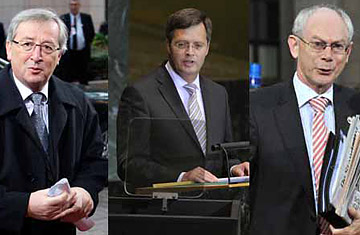
Jean-Claude Juncker, Jan Peter Balkenende and Herman Van Rompuy
There were no trumpet blasts or jubilant ceremonies to mark the occasion. But the decision by Czech President Vaclav Klaus to sign an agreement he loathed on Tuesday was momentous, nonetheless. The long-delayed passage of the Lisbon Treaty — the Czech Republic had been the last holdout among the European Union's 27 members — marks the end of an almost decade-long saga to reform the cumbersome institution and give it a stronger, more unified voice on the global stage.
The Lisbon Treaty, which comes into effect on Dec. 1, will allow the E.U. to streamline many of its voting and decision-making procedures to alleviate the bureaucratic tangles that slow the organization down. It will also create a European Council president and a new foreign policy chief and strengthen the powers of the European Parliament.
The treaty's supporters have long argued that the measures are essential to ensure the organization designed over half a century ago for six member countries can meet the demands of more than two dozen nations and a half billion people today.
Now comes the fun part for E.U. watchers and anyone interested in political intrigue: Who will get the top jobs in Brussels now that the big reform treaty is in place? Fredrik Reinfeldt, the Prime Minister of Sweden, which currently holds the rotating E.U. presidency, has already begun a round of telephone calls to draw up a shortlist of candidates for the new E.U. president and foreign policy chief positions. An emergency summit could be held as early as next week to decide.
Most of the focus will be on the E.U. president — a job that could provide an answer to Henry Kissinger's famous question about who he would call if he wanted to speak to Europe. What exactly the president will do — besides answering that 3 a.m. phone call from the White House — has yet to be firmed up. The Lisbon Treaty is vague about the job description beyond the official role of organizing E.U. summits and meeting with foreign leaders. The president could become a powerful, high profile and recognizable face for all of Europe. But momentum in the E.U. is building towards having a leader who is a skilled mediator first and foremost —someone who can ease internal tensions and get all 27 countries on the same page when need be.
This shift of focus partly explains why former British Prime Minister Tony Blair has seen his stock plummet — despite his celebrity, charisma and leadership qualities — since he was first mentioned as a contender for the job years ago. Now, the front-runners appear to be three low-key "fixers": Belgian Prime Minister Herman Van Rompuy, Dutch Prime Minister Jan Peter Balkenende and Luxembourg Prime Minister Jean-Claude Juncker. While all three may be somewhat bland and anonymous even in their home countries, they appeal to a growing number of E.U. countries — in particular the smaller ones — because they would excel at operating behind the scenes.
If the position of president turns into more of a managerial role, that could mean the real power player may be the new High Representative for Foreign and Security Policy, an awkward title for what is essentially the E.U. foreign minister. Whoever is named to this post will head the E.U.'s new 8,000-strong diplomatic service, oversee a $12 billion foreign aid budget and speak for the E.U. in key meetings with other countries.
Here's where Britain may receive a consolation prize after Blair's stunning reversal of fortune. British Foreign Minister David Miliband is being trumpeted as the frontrunner for the position — mainly because the post is expected to go to a candidate from the center-left and Miliband is talented, articulate and well liked in European circles. However, he's not a shoo-in for the job — other contenders are said to include former Italian Prime Minister Massimo D'Alema, former French Justice Minister Elisabeth Guigou and Swedish Foreign Minister Carl Bildt.
The choice does not come down to mere merit — politics, geography and gender will also play a part. E.U. leaders will want to make sure that the three posts of E.U. president, foreign policy chief and European Commission president are split between candidates from the centre-left and centre-right parties, big and small member states, northern and southern Europe, and, if possible, include a woman. (Former Irish President Mary Robinson has emerged as a potential E.U. president candidate.)
Yet this may not be enough to stop the usual E.U. squabbling in the end. The newly empowered leaders will likely have trouble preventing splits on major issues, if the 2003 dispute over the U.S.-led invasion of Iraq is anything to go by. With this in mind, perhaps a mediator is what the institution needs, not a power-player on the world stage, someone who will "stop traffic" in world capitals, as Miliband said last month in support of a Blair presidency.
"The Lisbon Treaty has the potential to herald the emergence of a new world actor — a Europe that can look upwards and outwards and is equipped with the bureaucratic tools to do so," says Daniel Korski, a senior policy fellow at the European Council on Foreign Relations (ECFR). But as the E.U. sets about implementing the Lisbon Treaty, Korski says the world must be patient while the new institutional infrastructure takes shape. "Butterflies are beautiful, in part because they take time to develop," he says.
